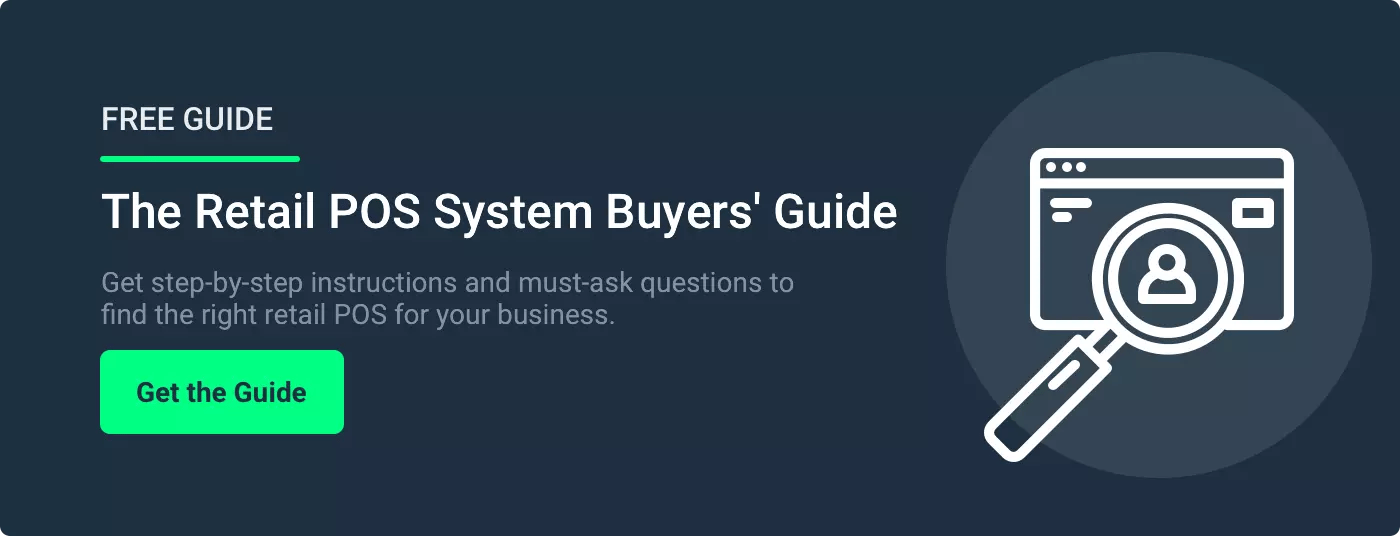Are you opening a retail business, and you have some big decisions to make? Or are you operating an existing small business and it’s time to reevaluate your processes?
Either way, modern SMBs all have one thing in common: they need an internet connection. Not all internet connections are the same, however, so how do you know which is best?
If you’re not sure whether you need a wired network or a Wi-Fi connection for your small business, this article is for you.
Wired Networks vs. Wireless Networks
Before diving in, let’s make sure you understand the difference between your network options.
Wired networks utilize Ethernet cables, which look a lot like traditional landline phone cords. An Ethernet connection allows you to link your devices to a wired network adapter, providing the device with internet access.
A wireless network, better known as Wi-Fi, allows devices to connect to the internet through a wireless router. Rather than using a cable, Wi-Fi uses radio frequencies to send signals to and from your business.
Now, what are some of the positive and negative points to keep in mind when choosing between a wired or wireless internet connection?
Wired Internet: Pros and Cons
The biggest downside to using a wired network is that you’re working with cords. Cables have to be strung through your work area and cashier stations, which can be messy. But if you plan appropriately and think of a way to keep cables organized, you and your team will get used to this, and it won’t be a huge deal.
If you’re opening a brand new business, something to keep in mind is where to run the cables themselves. Try to find a location that’s pre-wired, allowing you to set up your work stations exactly where you want. If that’s not an option, just plan to pay some extra costs for installation. (However, you would have to think about electrical outlets for POS stations regardless — so, having an ethernet connection run at the same time adds very little expense.)
When it comes to wired internet, in our opinion, the pros heavily outweigh the aforementioned cons.
To start, there’s no competition when it comes to speed. While a powerful Wi-Fi connection can be extremely fast, Ethernet connections will always take the cake.
As a small business owner/manager, reliability is a top priority. Ethernet connections rarely have an issue accessing the internet, as long as your provider is up and running as expected. A wired connection is always the most reliable for anyone who needs internet access to do their job. As long as nobody trips over the Ethernet cord in your storefront, you don’t have much else to worry about.
Last but certainly not least: safety. To be honest, neither connection option is completely safe nowadays, and there are still plenty of vulnerabilities and risks to be aware of. But if you’re weighing the two, a wired connection does protect against most hackers. And when you’re storing confidential data such as customer addresses and payment methods, this is a huge deal.
The greatest advantage of a wired connection, put simply, is this: Your business has a dedicated connection that’s not shared with others, which means there’s much less of a chance of interruption or compromise.
Wireless Internet: Pros and Cons
When it comes to Wi-Fi, the first thing to note is that it isn’t always dependable. Wireless connections often experience interference, and the strength of your connection will vary based on your geographic location. If you’re running your business on Wi-Fi, just remember: If something happens to your connection, you may have to close shop until the issue is resolved.
Another downside is a lack of security. If you’re using a wireless connection, it’s up to you to invest in another level of security so your data is protected. You’ll also have to pay close attention to who has access to what business data, where that data can be accessed, and assign regulations and/or credentials to your employees as a precaution.
To tag on to the security point, there’s another level of risk with hardware. You don’t want to use a printer on a wireless network, for example, because hackers could potentially gain access to your hardware, making changes to its settings. Running wireless hardware also slows down your connection, which is worth keeping in mind.
Now for the pros of a wireless connection. The first is flexibility. To start, there’s no need to worry about running wires throughout your storefront, as you can allow your team to work wherever and however they want. If you’d like your team to walk around using mobile devices to assist customers, Wi-Fi is a good option for you.
Next, while the initial setup process takes some time, utilizing Wi-Fi can be more efficient in the long run. Assuming you don’t have any connectivity issues, things can move quickly, even if you’re adding on a new workstation later on. When you add on a workstation with a wired connection, this process is much more time-intensive.
The greatest advantage of a wireless connection is the ease of use, which provides the flexibility that some retailers need.
Our Network Recommendation for SMBs
Our small business experts have worked with thousands of retailers like you, addressing their specific needs. When it comes to the type of internet connection you should utilize in your storefront, it really does depend on your wants and goals.
If you plan to be pretty mobile and you want to run your business on a tablet, then a wireless connection is probably the best option for you. But if you’re running your business on an all-in-one point of sale solution, and you value efficiency and security a bit more than mobility, then we will always recommend a wired internet connection.
The final recommendation is marrying both options together. If you want speed, reliability, and flexibility for your small business, you can choose to get a wired internet connection for your main POS and have Wi-Fi for backup and customer access. Luckily, you don’t have to decide on one or the other if you don’t think that’s right for you, and this can be customized to your needs!
If you’re new to the point of sale industry, we recommend starting with one of our free resources: The Retail Point of Sale System Buyers’ Guide. Otherwise, if you have any questions or you’d like to learn more about POS Nation, give our team a call at 1-877-727-3548.






![Cost to Revenue Ratio [Definition, Importance, and What's a Good or Bad Ratio?]](https://www.posnation.com/hs-fs/hubfs/Blog%20Featured%20Images/POS%20Nation%20Blog/cost-to-revenue-ratio.webp?width=520&height=294&name=cost-to-revenue-ratio.webp)


 by Brian Sullivan
by Brian Sullivan
